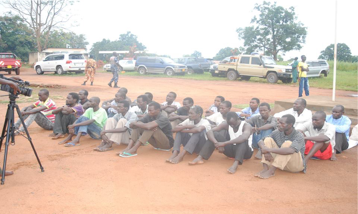Governor of Yei David Lokonga Moses has secured the release of 22 youths who had been held for several months without charge in military detention in Yei.
Upon release the 22 youths looked malnourished. They had been denied access to their family members, adequate food and healthcare whilst detained in the military barracks known as “Amiya” in Yei.
Lokonga says the release of the youths was the outcome of a visit by a fact-finding team of two presidential advisors who came to Yei recently.
The youths who were arrested by various military security agencies in different parts of Yei town and outskirts were accused of harboring and coordinating with rebels.
Lokonga told the youth to go home. “My message to you is that today: you are set free to go home and distance yourselves from rebel activities. I also need you to tell your brothers who went against the government to come home and dialogue so as to end the suffering of the people and collectively work for the implementation of the peace agreement.”
He also urged the security organs not to arrest citizens without clear evidence.
Meanwhile one of the released prisoners who spoke anonymously for security reasons thanked God and the state government for having kept them alive.
“I was arrested in Lutaya in September, detained and tortured for nothing,” he said. “I really don’t have much to say but I need to thank the state for having kept me alive. I was not part of their political game but just arrested on the road.”
He said many of his prison mates were picked at night and killed. “I don’t believe that we are only 22. We were many in different dark prison cells,” adding that the situation and the level of treatment in the cells is “beyond humanity.”
Meanwhile, a concerned citizen who feared re-arrest of the youth cautioned them to leave the area for their safety. “I would like to call on these youth to leave the area immediately because the security will once again turn to hunt for them at any time.”
Army brigade commander Chol Deng Chol reiterated his army’s commitment to protect the citizens and restrain themselves from further arrests but open a chapter for dialogue with armed groups in the state.




